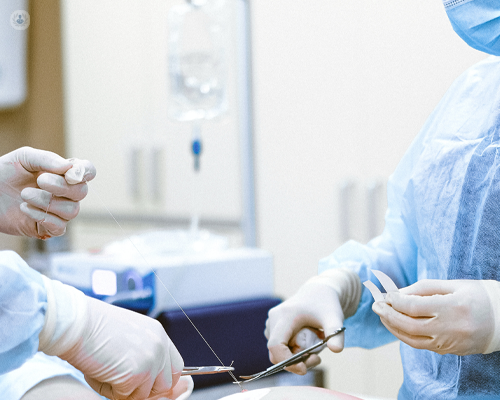All you need to know about minimally invasive gallstone surgery
Written in association with:Minimally invasive gallstone surgery, also known as laparoscopic cholecystectomy, is a surgical procedure to remove the gallbladder, which is often performed to treat gallstones. They are hard deposits that form in the gallbladder, leading to pain, inflammation and other complications if left untreated.
Here to tell us all we need to know about this procedure is leading consultant general, upper GI, and trauma surgeon Mr Lalin Navaratne.

What is minimally invasive gallstone surgery?
Minimally invasive gallstone surgery involves the removal of the gallbladder using a laparoscope - a thin, flexible tube with a camera and light attached. This technique allows surgeons to perform the surgery through small incisions, typically around one to two centimetres, rather than a large open incision.
What are the benefits of minimally invasive surgery?
- Smaller incisions: The procedure requires only a few small incisions, reducing scarring and the risk of infection.
- Reduced pain: Patients usually experience less postoperative pain compared to traditional open surgery.
- Quicker recovery: Most patients can return to their normal activities within a week, compared to a longer recovery period with open surgery.
- A shorter hospital stay: Many patients are discharged the same day or within 24 hours after surgery.
How is the procedure performed?
During a laparoscopic cholecystectomy, the patient is placed under general anaesthesia. The surgeon makes small incisions in the abdomen and inserts the laparoscope and other specialised surgical instruments. The laparoscope provides a magnified view of the gallbladder on a monitor, allowing the surgeon to carefully remove the gallbladder.
Once the gallbladder is removed, the small incisions are closed with stitches or surgical glue. The procedure typically takes about one to two hours.
What to expect after surgery?
After minimally invasive gallstone surgery, patients can expect:
- Mild discomfort: Some pain at the incision sites or in the shoulder (due to the gas used to inflate the abdomen during surgery) is common but usually resolves within a few days.
- Dietary changes: Patients may need to follow a low-fat diet temporarily as the body adjusts to the absence of the gallbladder.
- Gradual return to normal activities: Light activities can usually be resumed within a few days, with full recovery expected within a week or two.
Is minimally invasive surgery suitable for everyone?
While laparoscopic cholecystectomy is the preferred method for treating gallstones, it may not be suitable for everyone. Patients with severe inflammation, scarring from previous surgeries, or other complex conditions may require a traditional open cholecystectomy. Your surgeon will assess your individual case to determine the most appropriate approach.
Minimally invasive gallstone surgery is a safe and effective option for most patients, offering numerous benefits over traditional surgery, including faster recovery and less postoperative discomfort.
If you’re considering minimally invasive gallstone surgery, arrange a consultation with Mr Navaratne via his Top Doctors profile.


